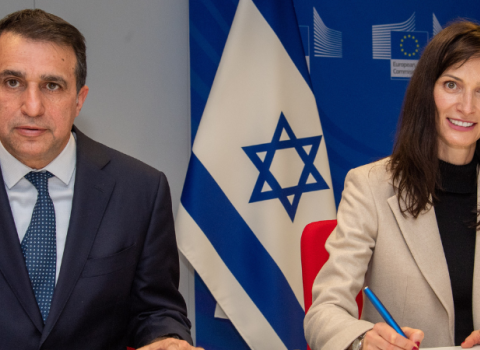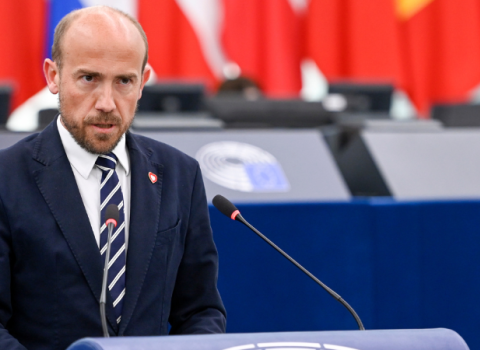The EU has launched its first ever military research competition, offering grants for new military hardware including drones and lighter-weight armour for soldiers.
Details of the historic push by the EU into a new phase of cooperation on military research were unveiled on Wednesday by Jyrki Katainen, Commission vice-president, and Federica Mogherini, foreign policy chief, with the promise of at least €1.5 billion a year for research and the purchase of assets. The Commission expects this money could grow to some five times this amount after 2020 if enough governments come forward with funds.
A fraction of this, €25 million, is available for the first competition round, with the biggest chunk of money, €15.5 million, to go to proposals for a new underwater stealth drone.
The Commission will award a further €6.8 million for lighter-weight armour for soldiers that simultaneously protects against chemical, biological or radiological attack, and new camouflage methods that can go undetected by advanced sensors.
A smaller amount of money – €1 million – is on offer for a technology foresight analysis.
The rules for applicants, set by the European Defence Agency, which is running the calls, are strict.
At least three companies and two member states will have to be involved for a project to be eligible for financing from the EU’s common budget. Deadlines are in September and October, with the first grant agreements due to be signed by the end of 2017.
Facilities, assets and resources used by successful applicants, including subcontractors, “should not be located on the territory of non-member states”, although European subsidiaries of foreign-owned companies may bid for funding.
Research results “have to stay in Europe”, said an EU official, who stressed that national governments would remain the owners of all equipment. The Commission will be able to block the licensing of a product to another company or government based outside the EU.
The use of regional funds by local governments for defence-related projects is to be allowed in the future.
The Commission announced last November that it would dedicate €90 million to research on defence up to 2020, the end of the current EU budget cycle, marking a dramatic new direction for the executive that until now has been restricted by law to fund research with civil applications only.
A decision on whether to start a new, dedicated defence research programme in 2021, or simply run the defence stream within Framework Programme 9, is still pending.
Defence facilitator
A second plank of the defence plan foresees the Commission sharing the cost of developing military hardware with member states, as a way of cutting down on wasteful overlap. Commission officials estimate that around 30 per cent of expenditure could be saved if nations purchased equipment jointly.
The EU will be “a defence facilitator” offering money and coordination, said a Commission official, dismissing accusations that the bloc is gradually setting up its own independent military capabilities.
For every euro spent to develop a piece of kit, the Commission will be prepared to put in €4. If a prototype fails, EU finances will take the first loss.
Contentious
Despite a survey by the Commission that shows strong support for the move into defence research, early indications are that the far-reaching plan is extremely polarising.
Manfred Weber MEP, who leads the largest political group in the European Parliament, the European People's Party, said the proposal is the second biggest thing the EU has taken on after the launch of the euro single currency.
Weber comes from Germany, which alongside France is the main proponent of the drive for deeper defence integration. Members of the German government have become vocal supporters for EU defence spending, amid growing concern that the US is turning into an unreliable ally under President Donald Trump.
On the other hand, the far-left MEP Sabine Lösing, also German, described the plan as a “dark day” for Europe. “We are at the start of a very slippery slope,” she said. “The defence industry might be pleased as punch – but it’s a dark day for those of us who are working towards a peaceful and social European Union."
Peace campaigners responded in a similar manner, accusing the Commission of stretching EU law to its limits and “trivialising” weapons production.
“These proposals are not in the interest of EU citizens, but only benefiting an industry which is fuelling armed conflicts,” said Bram Vranken, a researcher and campaigner with Belgian peace group Vredesactie.
Others questioned whether the money would not be better spent on bolstering NATO. “We should do our defence research through NATO,” said Hans-Olaf Henkel, a rightwing MEP. “I am sure Russia’s Vladimir Putin would love to see the development of EU defence and the moving away from NATO.”
Henkel, a longstanding eurosceptic, said, like Weber, that the plan brought to mind the creation of the single European currency. “I have the impression that there are politicians who are trying to get to a European defence union through financing defence research. That reminds me of introducing the euro in order to get eventually to the United States of Europe. We should not make that mistake again,” he said.
Strategic autonomy
Brexit has provided the most obvious spur to the EU’s defence ambitions. The UK has long rejected the idea of enhanced military cooperation, concerned that it would be expensive and duplicate things for which NATO is much better equipped.
Now, preparing for threats from both within and outside the continent has shot up the EU’s agenda, with the election of Trump giving further impetus to officials call Europe’s “strategic autonomy,” an ability to act independently of other major powers. Trump has sharply criticised European countries for low defence spending.
Closing the large gap in military spending and capabilities between Europe and the US will be hard. EU member states spend almost seven times less than the US on defence R&D, according to EU analysts. Defence companies do not normally invest in R&D, unless they have a commitment by the government, as their only customer, to procure the products they are developing.





 A unique international forum for public research organisations and companies to connect their external engagement with strategic interests around their R&D system.
A unique international forum for public research organisations and companies to connect their external engagement with strategic interests around their R&D system.